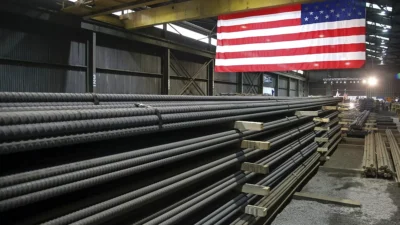Key Takeaways:President Donald Trump announced that a 25% tariff on all steel and aluminum imports, including those from Canada and Mexico,

Key Takeaways:
- President Donald Trump announced that a 25% tariff on all steel and aluminum imports, including those from Canada and Mexico, took effect Monday.
- The administration introduced additional import duties later in the week, with potential implications for consumer goods and retail supply chains.
- Stock prices of U.S. steel companies surged in response, while global markets showed signs of uncertainty.
- Retailers importing goods reliant on steel and aluminum faced higher costs, potentially leading to price increases for consumers.
Details:
President Donald Trump confirmed that the U.S. imposed a 25% tariff on all steel and aluminum imports starting Monday, a move expected to have ripple effects across industries, including retail.
“Any steel coming into the United States has a 25% tariff,” Trump told reporters aboard Air Force One on Sunday as he traveled to New Orleans for the Super Bowl. When asked about aluminum, he clarified, “Aluminum, too,” confirming that the same trade penalties applied.
Impact on Retailers and Supply Chains
Retailers that relied on steel and aluminum for product manufacturing, packaging, and infrastructure experienced cost increases. Sectors such as home appliances, electronics, and even canned goods saw price adjustments as suppliers passed on higher costs. Furniture retailers, automobile dealers, and construction supply chains also faced challenges in maintaining competitive pricing.
With many major retail brands dependent on international sourcing, companies that relied on imported fixtures, shelving, and display cases had to reassess budgets or renegotiate contracts with domestic suppliers.
“We’ve already seen price hikes from past tariffs, and if these stay in place long-term, retailers will have had to make tough pricing decisions,” said a retail analyst from Market Insight Group.
Stock Market and Economic Response
Following Trump’s announcement, shares of U.S. steel manufacturers jumped in pre-market trading. Cleveland-Cliffs, which was working to acquire U.S. Steel, saw its stock price increase by 8%. Other steel companies, including Nucor and Steel Dynamics, experienced gains between 6% and 8%.
However, financial markets reacted negatively on Friday when Trump initially signaled the move, reflecting investor fears of inflationary pressure and economic slowdown. The consumer sentiment index also declined, with many Americans citing tariffs as a concern for rising costs in the months ahead.
Reciprocal Tariffs and Trade War Risks
Trump also reaffirmed plans to implement “reciprocal tariffs” by midweek, targeting countries that had imposed duties on U.S. goods. While details remained unclear, such measures could have affected a wide range of imported products, from textiles to electronics, further complicating retail pricing strategies.
“If they were charging us 130% and we were charging them nothing, it wasn’t going to stay that way,” Trump said.
Concerns from Global Trading Partners
The announcement triggered swift reactions from international leaders. South Korea’s acting president, Choi Sang-mok, convened a meeting with top trade officials to assess the impact on the country’s steel exports. South Korean steelmakers, including POSCO and Hyundai Steel, saw stock prices decline following the news.
Meanwhile, Trump’s approach to tariffs raised fresh concerns about potential retaliatory measures from key trading partners, which could have further affected the cost of imported retail goods.
For more updates on how tariffs will impact retail pricing and supply chains, follow our continued coverage.
Original article source: “Trump says he will announce 25% steel and aluminum tariffs Monday, and more import duties are coming” published by AP News on [February 10, 2025].
